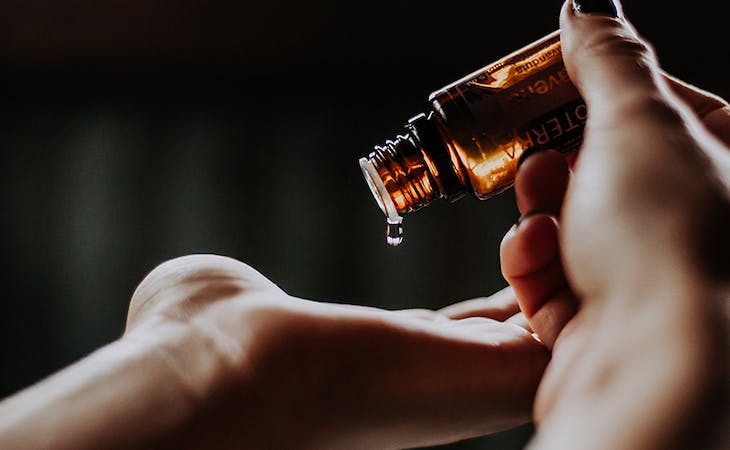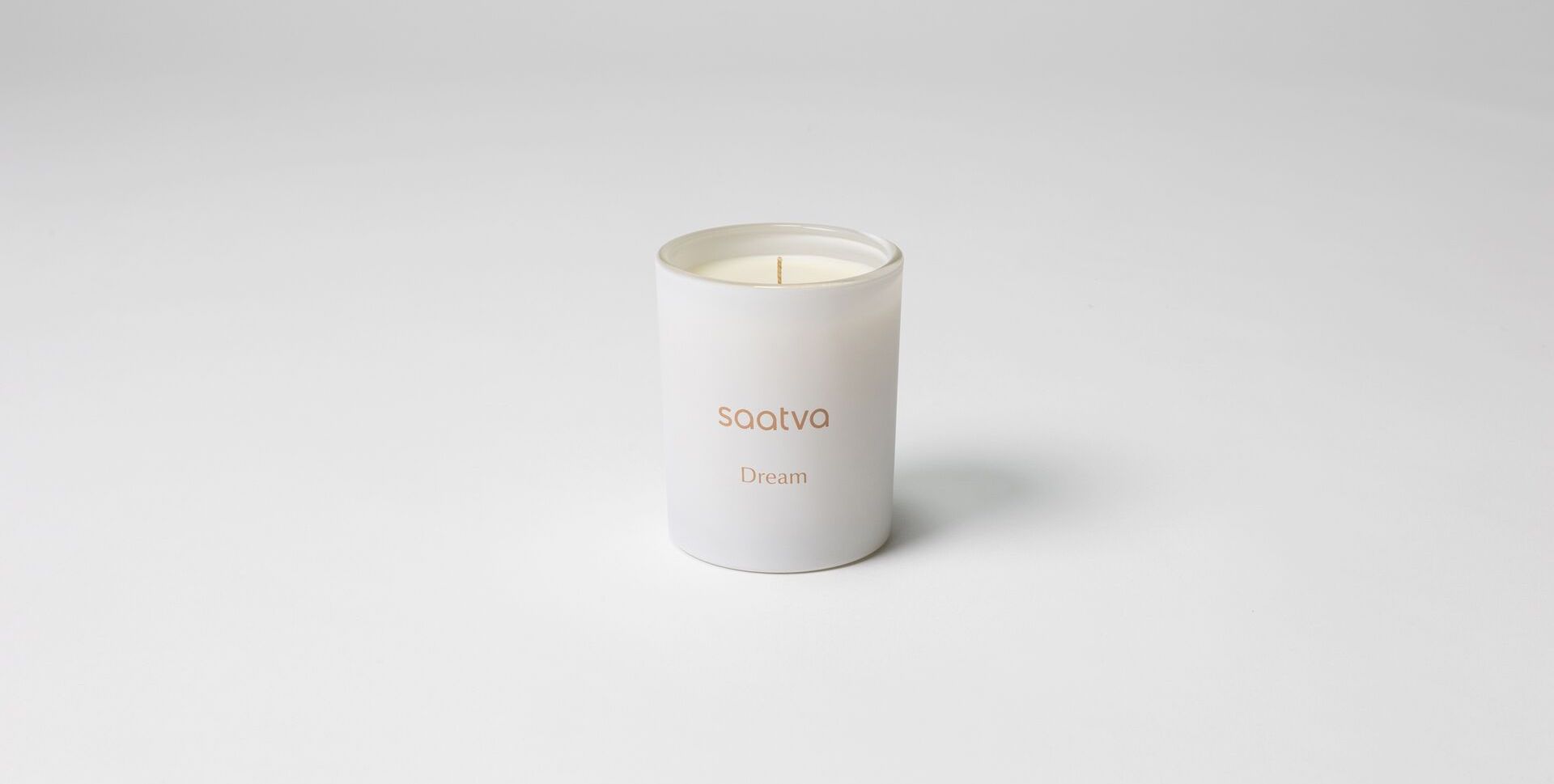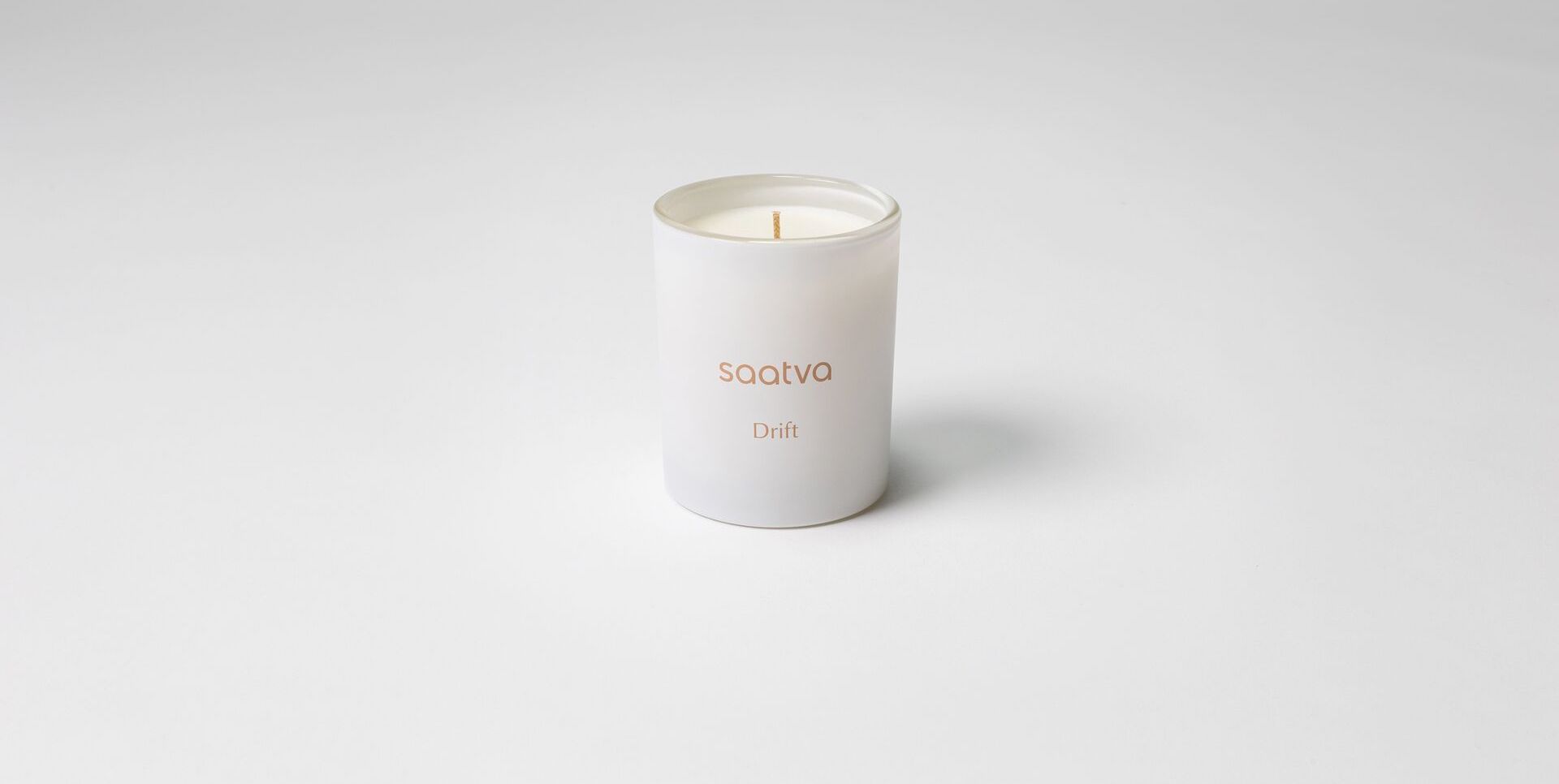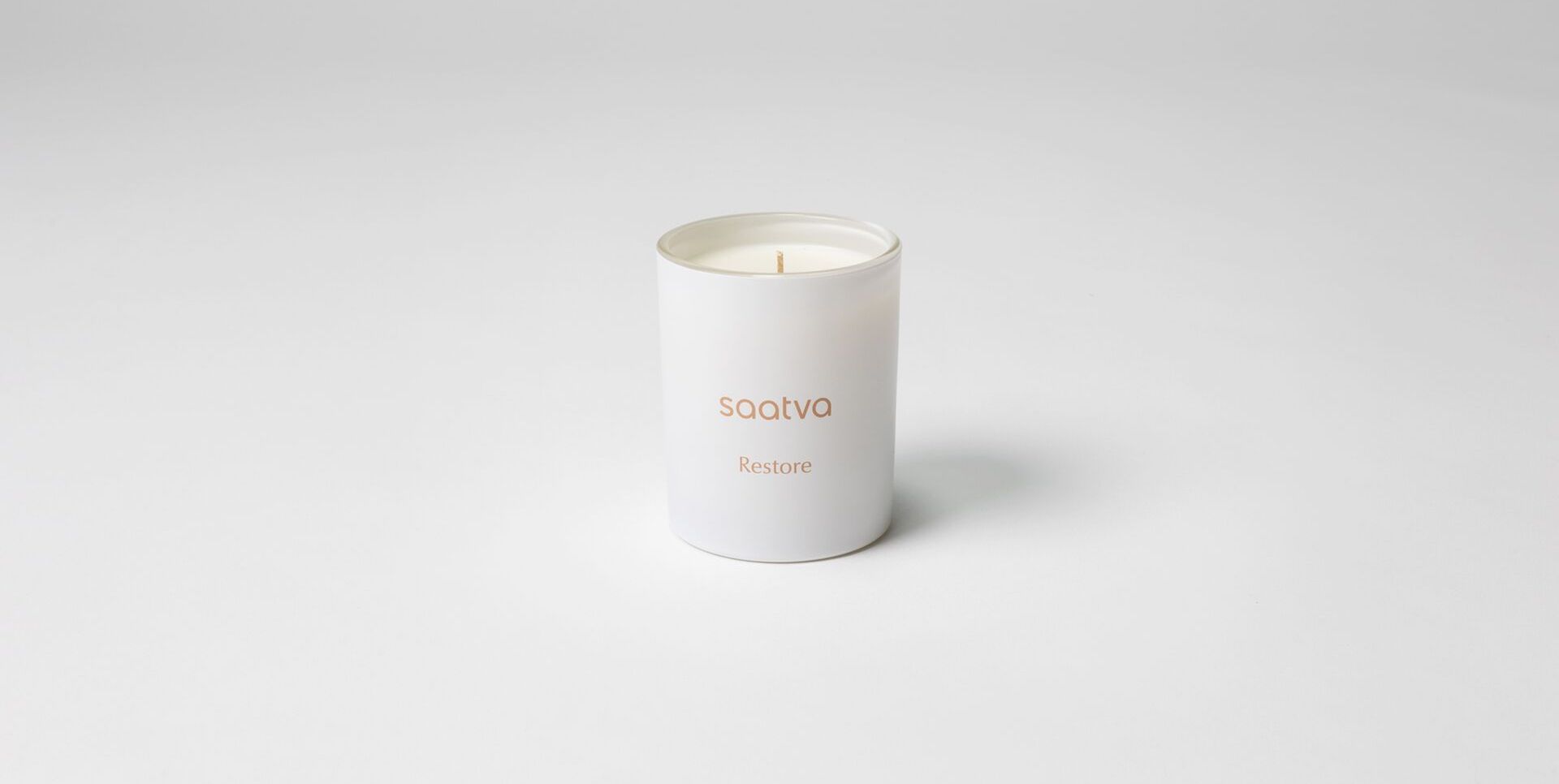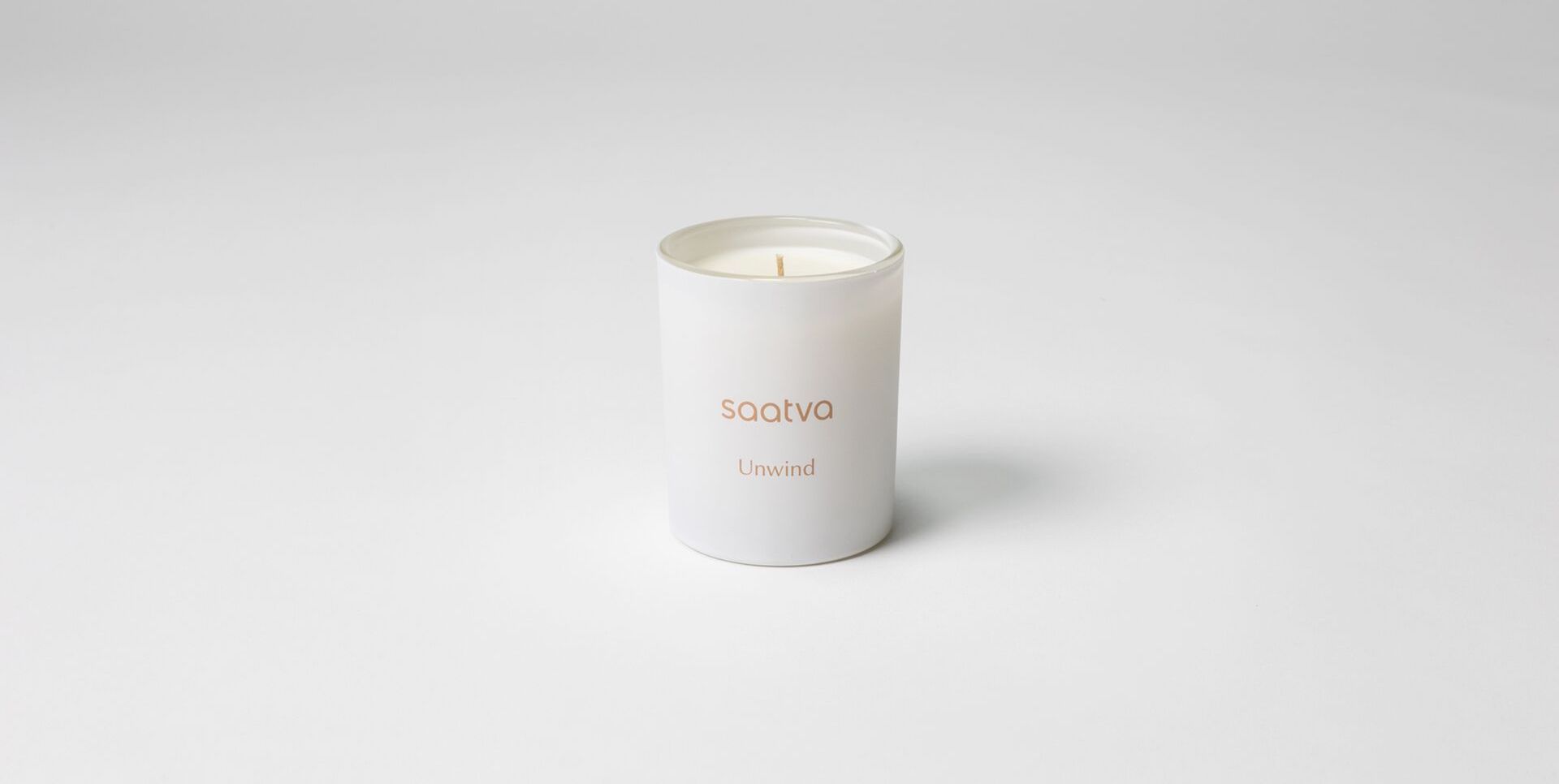One easy way to combat sleep-wrecking stress? Take advantage of the calming properties of essential oils and use aromatherapy for sleep.
Ahead, we’re explaining what essential oils are, the various health benefits of essential oils, and how to incorporate them into your routine to improve your sleep.
What are essential oils—and how are they made?
“Essential oils are the liquids extracted from various parts of the plant, such as the root, peel, flower, leaf, or wood,” explains Valerie Bennis, president and founder of the aromatherapy company Essence of Vali in New York City. They’re the “essence” or “sweat” of a plant, and they’re actually more liquidy than they are oily, says Bennis.
Essential oils are most commonly extracted through a process known as steam distillation. [1] During the distillation process, the vapor that’s released from the steamed plants cools until it turns into a liquid.
The second method of essential oil extraction is expression, says Bennis. This specifically applies to citrus fruits. During the expression process, citrus essential oils are extracted from peels via cold pressing. [2]
Essential oil quality varies widely, but there are ways to ensure you’re getting a quality product. Bennis suggests doing your research and buying from companies that have been around for a long time. Health food stores and stores like Whole Foods are good places to buy essential oils from, she says.
Health benefits of essential oils
Essential oils date back to ancient times as a popular aromatherapy treatment. [3] Many people believe essential oils have a ton of health benefits, including fighting off colds, improving your memory, and relieving headaches. [3, 4]
A study published in the Journal of Alternative and Complementary Medicine found that inhaling essential oils can also help people with mild sleep issues. [5] That makes sense, given that research has noted that certain essential oils have anti-anxiety benefits and depression-relieving effects. [6, 7]
The best essential oils for sleep
Not all essential oils have the same benefits. Some are better at relieving stress and promoting sleep than others. Here are the best essential oils to help you sleep. Sniff ’em and snooze!
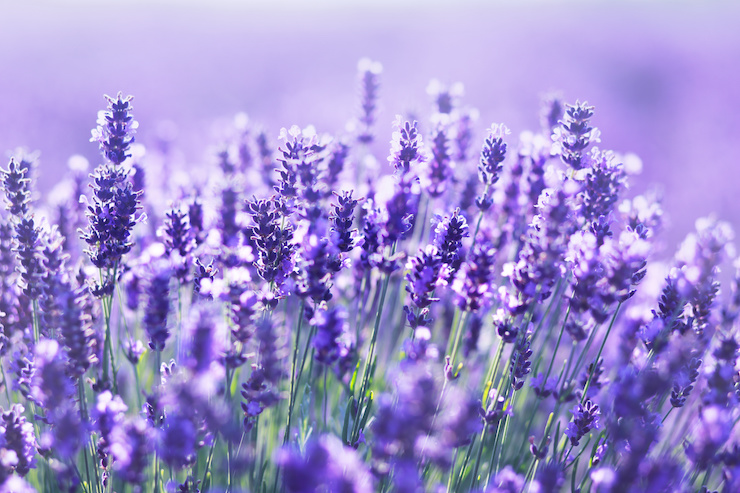
Lavender
If there’s one essential oil you’ve heard of or tried before, it’s likely lavender. This purple plant is known for its sleep-promoting properties, and it’s readily available in lots of products. [8] While using lavender oil for sleep isn’t a novel idea, you may not know the science behind why, exactly, it makes such a great sleep aid.
A study published in the journal Chronobiology International found that inhaling lavender before bed increased how much deep sleep participants experienced. [9]
Additionally, a study out of a university in Thailand noted that inhaling lavender oil can decrease blood pressure, heart rate, and skin temperature. [10] Participants in this study who inhaled lavender said they felt fresher and more relaxed.
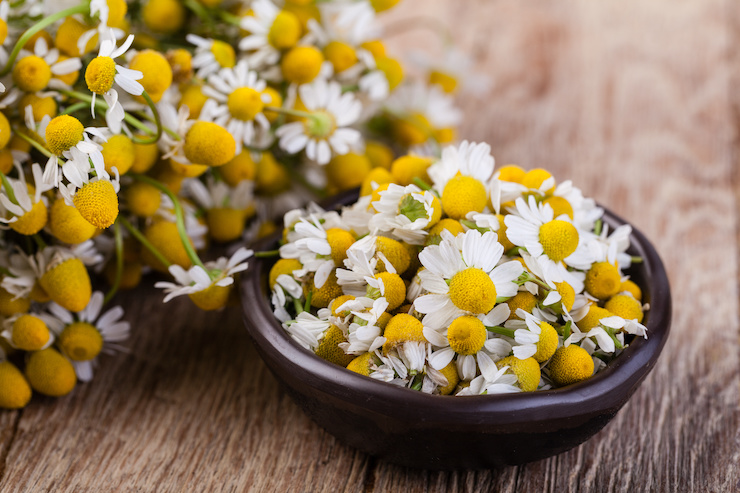
Chamomile
It makes sense that chamomile essential oil would be a leading essential oil for sleep. After all, chamomile tea is very relaxing.
A study published in the International Journal of Aromatherapy looked at the effects Roman chamomile had on mood and alertness. [11] Participants who whiffed chamomile became calmer and drowsier.
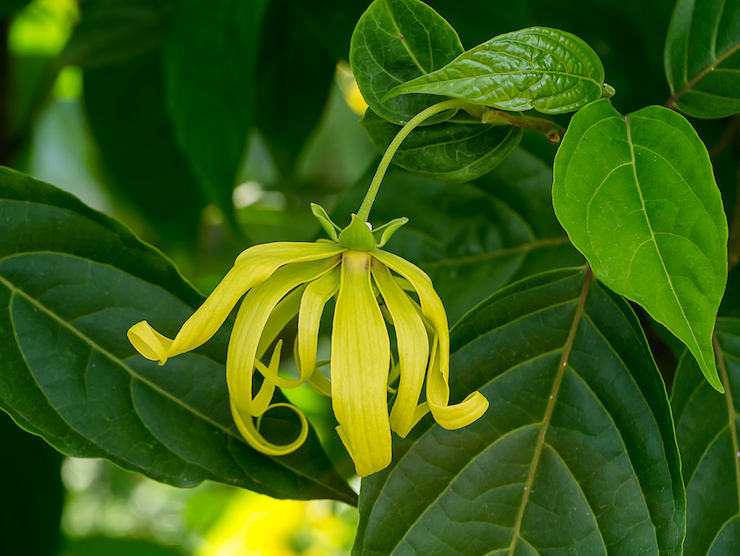
Ylang-ylang
Ylang-ylang is a popular scent found in perfumes, and it’s been proven to soothe the mind.
When participants in a Korean study inhaled a blend of ylang-ylang, lavender, and bergamot once daily for four weeks, they had lower stress, anxiety, and blood pressure at the end of the study. [12]
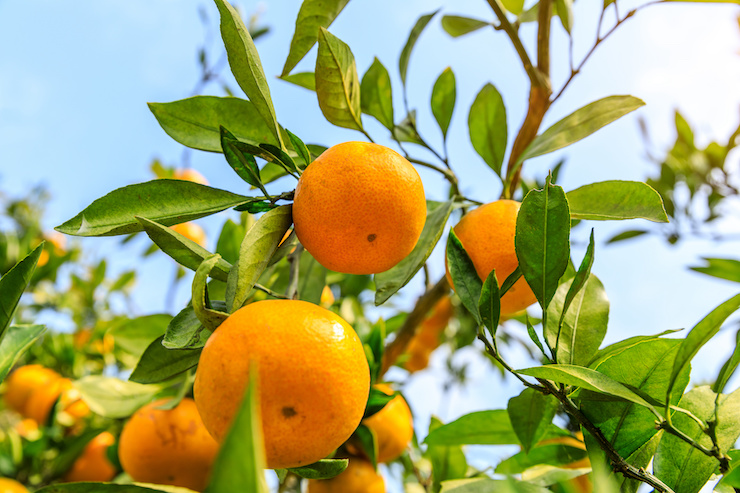
Sweet orange
Citrus scents like sweet orange have not only been proven to boost your mood, but they also have very relaxing qualities too. [13]
For a study published in the journal Advanced Biomedical Research, scientists had 30 children ages 6-9 inhale sweet orange essential oil before going to the dentist (a very stressful event for many of us!) and then go to the dentist again without smelling any citrus scents. [14]
The kiddos had lower pulse rates and cortisol levels after inhaling sweet orange essential oil.
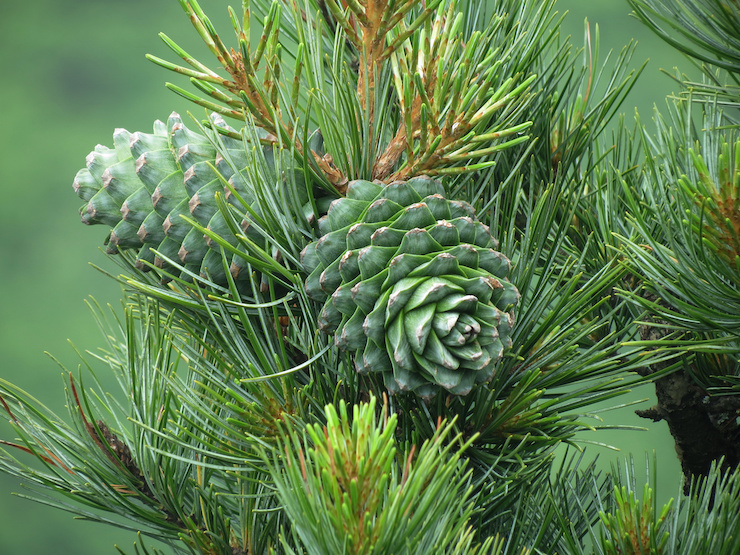
Cedarwood
Take a deep inhale of cedarwood, one of the most popular winter scents, for a major dose of relaxation.
According to a study published in the journal Autonomic Neuroscience, participants who smelled cedrol, a compound extracted from cedarwood oil, had an increase in activity in the parasympathetic nervous system and a decrease in activity in the sympathetic nervous system. [15]
The parasympathetic nervous system is also known as the “rest and digest system.” It slows your heart rate and relaxes the muscles in your GI tract. Your sympathetic nervous system, on the other hand, is responsible for what we call the “fight or flight response.” It increases your heart rate and adrenaline. [16]
More parasympathetic activity and less sympathetic activity amounts to a more relaxed state. Using cedarwood essential oil for sleep can help tone down your adrenaline levels and make it easier for you to fall asleep.
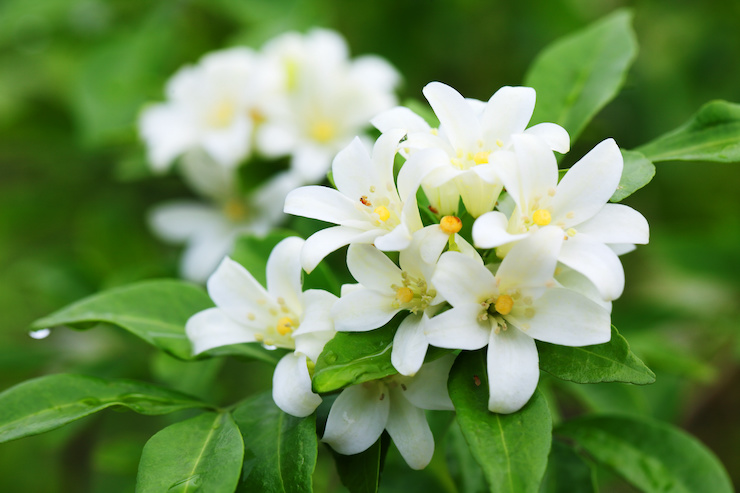
Jasmine
This delicate flower is a lot more potent than you may have thought. Research out of Wheeling Jesuit University found that sniffing jasmine leads to better sleep, less anxiety, and improved mental performance. [17]
Professor Bryan Raudenbush came to that conclusion after monitoring the sleep quality of 20 people over three nights. The research participants either inhaled jasmine or lavender scent that had been pumped into the air or no odor.
When the participants sniffed jasmine, they had improved sleep quality and less movement while sleeping. When they woke up, they reported less anxiety and better cognitive function. (Jasmine is one of the top seven bedroom plants that improve sleep—see what else made the list.)
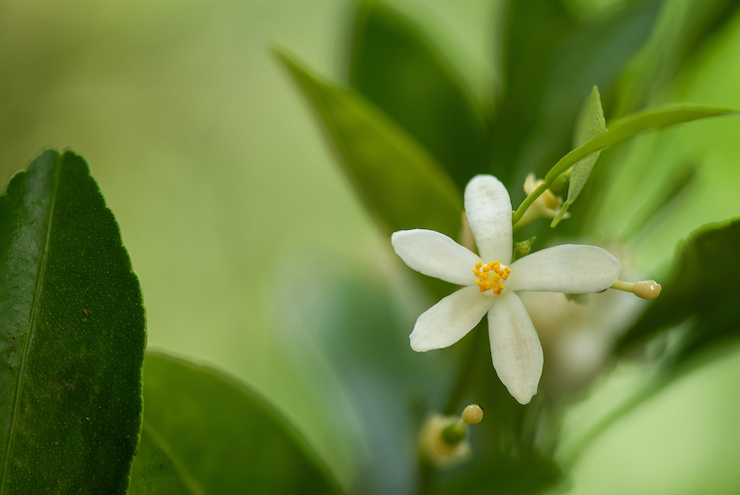
Neroli
Neroli isn’t quite as popular as some of the other essential oils on this list, but it’s still one of the best essential oils that help you sleep so it’s worth your time.
A study published in the journal Evidence-Based Complementary and Alternative Medicine specifically looked at the effects inhaling neroli oil had on menopausal symptoms, stress, and estrogen in post-menopausal women. [18]
Sixty-three healthy post-menopausal women inhaled either neroli oil or almond oil (the control) for five minutes twice daily for five days. Those in the neroli oil-inhaling group had lower blood pressure, cortisol levels, and estrogen than the control group.
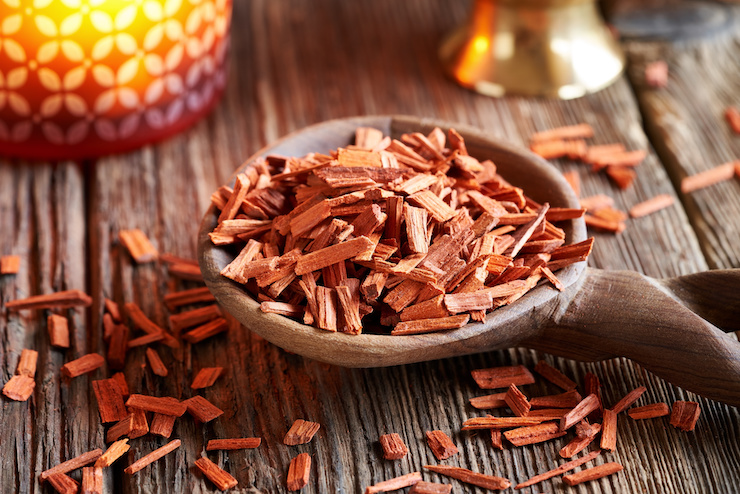
Sandalwood
Santalol, a compound in sandalwood oil, is known to have sedative effects. A Japanese study put sandalwood oil to the test on sleep-deprived rats.
After inhaling sandalwood oil, the rats experienced a decrease in total waking time and an increase in deep sleep. [19] Based on these results, the researchers theorized that sandalwood could be used in humans with sleep difficulties.
Meanwhile, a study published in the journal Complementary Therapies in Clinical Practice found that inhaling sandalwood oil curbed the anxiety levels of patients in palliative care. [20]
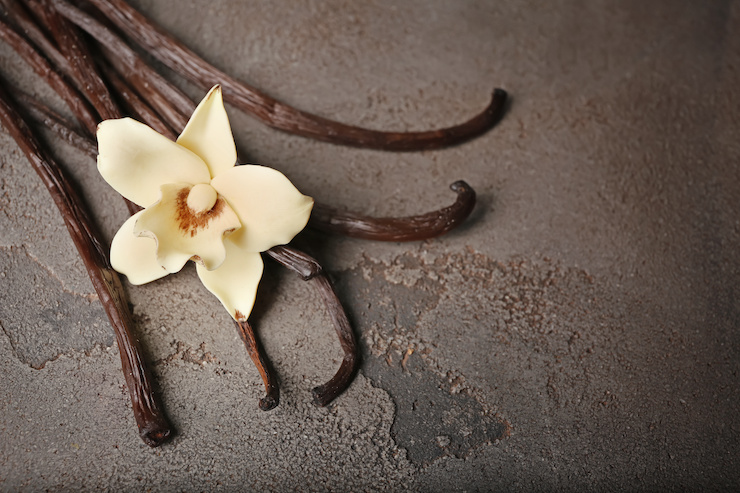
Vanilla
Vanilla doesn’t just smell delicious—it turns out that it’s got some pretty neat anti-anxiety benefits.
For a study published in the Journal of Magnetic Resonance Imaging, 57 patients either inhaled heliotropin (a vanilla-like scent) with humidified air or humidified air without any added scent during an MRI procedure to diagnose cancer. [21]
Those who breathed in the heliotropin had less anxiety during the procedure than those who breathed in non-scented air.
How to use essential oils for sleep
Bennis notes that blending multiple essential oils together can be more effective at relaxing you and promoting good sleep than using a single essential oil on its own. [22]
“Most people are familiar with lavender, she says, but when you mix it with other essential oils that are relaxing, it’s more powerful,” she says.
Aromatherapists call these blends “synergies.” Bennis’s favorite synergy of essential oils for nighttime is lavender, marjoram, cedarwood, and ylang-ylang—this is the sleep blend she’s been selling for more than 18 years.
Essential oils should always be mixed with a carrier oil (like jojoba) or distilled water—they’re super-concentrated, so you’ll only need to add a couple drops to your chosen base.
If you’re interested in pairing a few essential oils together, your safest bet is to buy aromatherapy blends because getting scent combinations just right on your own can be tricky.
“You want an aromatherapy formula that smells good,” says Bennis, and one too many drops of ylang-ylang will not make for a pleasant scent.
Where to apply essential oils for sleep
Here are the most popular ways to use essential oils for better sleep.
- Mist them on your pillow. Spritz your pillow with an aromatherapy spray before you go to bed. Try this DIY recipe from Wellness Mama, which combines ylang-ylang, lavender, and bergamot. Bennis says that if you’re DIYing aromatherapy blends, it’s best to store them in dark glass bottles. Sprays will separate—since oil and water don’t mix—so you’ll have to shake the bottle before use.
- Dab them on your wrists. Essential oils should always be diluted before you apply them to your skin because they’re very strong. Add a couple of drops of your chosen essential oil to a carrier oil, then dab a small amount onto your pulse points and inhale.
- Add them to a bath. Taking a nighttime bath promotes better sleep—so up your bath game by squeezing a couple of drops of your favorite essential oil into your tub.
- Put them in a diffuser. Placing a diffuser in your bedroom is a great way to fill your space with a relaxing scent, says Bennis. You can find inexpensive diffusers on Amazon, like this one from URPOWER.
FAQs
Which essential oil is best for sleeping?
Lavender essential oil is widely recognized as the best for promoting sleep. Research shows it can enhance deep sleep and reduce stress when inhaled before bedtime.
How do you use essential oils for sleep and anxiety?
Essential oils can be misted on pillows, applied to pulse points when mixed with a carrier oil, added to a relaxing bath, or diffused in the bedroom to create a calming atmosphere.
How do you use lavender oil for sleep?
Lavender oil can be inhaled directly, applied to pulse points after mixing with a carrier oil, or used in a pillow spray to promote relaxation and improve sleep quality.
Essential oils can not only help you relax—they can help make your bedroom smell better too. Here are our top tips for a fresh-smelling bedroom.
References
- Tosta Machado, C. A., Saraiva Hodel, K. V., Lepikson, H. A., & Souza Machado, B. A. (2024). Distillation of essential oils: An innovative technological approach focused on productivity, quality and sustainability. PLOS ONE, 19(2), e0299502. https://doi.org/10.1371/journal.pone.0299502
- Encyclopedia Britannica. Citrus Oil. https://www.britannica.com/technology/expression-industrial-process
- Elshafie, H. S., & Camele, I. (2017). An Overview of the Biological Effects of Some Mediterranean Essential Oils on Human Health. BioMed Research International, 2017, 9268468. https://doi.org/10.1155/2017/9268468
- Woo, C. C., Miranda, B., Sathishkumar, M., Yassa, M. A., & Leon, M. (2023). Overnight olfactory enrichment using an odorant diffuser improves memory and modifies the uncinate fasciculus in older adults. Frontiers in Neuroscience, 17, 1200448. https://doi.org/10.3389/fnins.2023.1200448
- Lillehei, A. S., & Halcon, L. L. (2014). A systematic review of the effect of inhaled essential oils on sleep. Journal of alternative and complementary medicine (New York, N.Y.), 20(6), 441–451. https://doi.org/10.1089/acm.2013.0311
- Lee, Y. L., Wu, Y., Tsang, H. W., Leung, A. Y., & Cheung, W. M. (2011). A systematic review on the anxiolytic effects of aromatherapy in people with anxiety symptoms. Journal of alternative and complementary medicine (New York, N.Y.), 17(2), 101–108. https://doi.org/10.1089/acm.2009.0277
- Yim, V. W., Ng, A. K., Tsang, H. W., & Leung, A. Y. (2009). A review on the effects of aromatherapy for patients with depressive symptoms. Journal of alternative and complementary medicine (New York, N.Y.), 15(2), 187–195. https://doi.org/10.1089/acm.2008.0333
- Lillehei, A. S., Halcón, L. L., Savik, K., & Reis, R. (2015). Effect of Inhaled Lavender and Sleep Hygiene on Self-Reported Sleep Issues: A Randomized Controlled Trial. Journal of Alternative and Complementary Medicine, 21(7), 430. https://doi.org/10.1089/acm.2014.0327
- Goel, N., Kim, H., & Lao, R. P. (2005). An Olfactory Stimulus Modifies Nighttime Sleep in Young Men and Women. Chronobiology International, 22(5), 889–904. https://doi.org/10.1080/07420520500263276
- Sayorwan, W., Siripornpanich, V., Piriyapunyaporn, T., Hongratanaworakit, T., Kotchabhakdi, N., & Ruangrungsi, N. (2012). The effects of lavender oil inhalation on emotional states, autonomic nervous system, and brain electrical activity. Journal of the Medical Association of Thailand = Chotmaihet thangphaet, 95(4), 598–606. https://pubmed.ncbi.nlm.nih.gov/22612017/
- Moss, M., Howarth, R., Wilkinson, L., & Wesnes, K. (2006). Expectancy and the aroma of Roman chamomile influence mood and cognition in healthy volunteers. International Journal of Aromatherapy, 16(2), 63-73. https://doi.org/10.1016/j.ijat.2006.04.002
- Hwang J. H. (2006). The effects of the inhalation method using essential oils on blood pressure and stress responses of clients with essential hypertension. Taehan Kanho Hakhoe chi. 36(7), 1123–1134. https://doi.org/10.4040/jkan.2006.36.7.1123
- Komori, T., Fujiwara, R., Tanida, M., Nomura, J., & Yokoyama, M. M. (1995). Effects of citrus fragrance on immune function and depressive states. Neuroimmunomodulation, 2(3), 174–180. https://doi.org/10.1159/000096889
- Jafarzadeh, M., Arman, S., & Pour, F. F. (2013). Effect of aromatherapy with orange essential oil on salivary cortisol and pulse rate in children during dental treatment: A randomized controlled clinical trial. Advanced Biomedical Research, 2, 10. https://doi.org/10.4103/2277-9175.107968
- Dayawansa, S., Umeno, K., Takakura, H., Hori, E., Tabuchi, E., Nagashima, Y., Oosu, H., Yada, Y., Suzuki, T., Ono, T., & Nishijo, H. (2003). Autonomic responses during inhalation of natural fragrance of Cedrol in humans. Autonomic neuroscience : basic & clinical, 108(1-2), 79–86. https://doi.org/10.1016/j.autneu.2003.08.002
- McCorry, L. K. (2007). Physiology of the Autonomic Nervous System. American Journal of Pharmaceutical Education, 71(4), 78. https://doi.org/10.5688/aj710478
- WorldHealth.net. Jasmine Found to Encourage Restful Sleep. https://worldhealth.net/news/jasmine_found_to_encourage_restful_sleep/
- Choi, S. Y., Kang, P., Lee, H. S., & Seol, G. H. (2014). Effects of Inhalation of Essential Oil of Citrus aurantium L. Var. Amara on Menopausal Symptoms, Stress, and Estrogen in Postmenopausal Women: A Randomized Controlled Trial. Evidence-Based Complementary and Alternative Medicine : ECAM, 2014, 796518. https://doi.org/10.1155/2014/796518
- Ohmori, A., Shinomiya, K., Utsu, Y., Tokunaga, S., Hasegawa, Y., & Kamei, C. (2007). Nihon shinkei seishin yakurigaku zasshi = Japanese journal of psychopharmacology, 27(4), 167–171.
- Kyle G. (2006). Evaluating the effectiveness of aromatherapy in reducing levels of anxiety in palliative care patients: results of a pilot study. Complementary therapies in clinical practice, 12(2), 148–155. https://doi.org/10.1016/j.ctcp.2005.11.003
- Redd, W. H., Manne, S. L., Peters, B., Jacobsen, P. B., & Schmidt, H. (1994). Fragrance administration to reduce anxiety during MR imaging. Journal of magnetic resonance imaging : JMRI, 4(4), 623–626. https://doi.org/10.1002/jmri.1880040419
- Harris, R. (2002). Synergism in the essential oil world. International Journal of Aromatherapy, 12(4), 179-186. https://doi.org/10.1016/S0962-4562(02)00083-8

